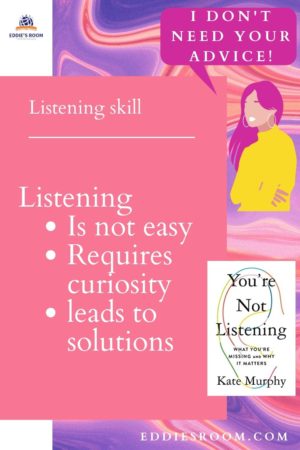This is another book we can learn about the listening skill. This time the author is Kate Murphy who is a journalist who has written for The New York Times, The Wall Street Journal, The Economist, and so on.
Here are what I learn from this book.
Listening is not easy
Hearing is passive. Listening is active.
When we listen to music, we just relax and don’t pay attention to the singer what he or she sings. I think this is hearing, a passive action.
However, when we are negotiating with someone, we have to focus on what they say and try to understand their needs. This is listening and it takes effort.
The one interesting story of this book is CIA recruits good listeners as CIA agents rather than training the agents after recruiting. It does mean improving the listening skill is not quick and easy. If we can’t improve our listening skills well, that would be normal.
Listening requires curiosity
“While you might think you’d be more likely to listen to a loved one than a stranger, in fact, the opposite is often true.”
Yes, I completely agree with this because my wife frequently says to me that you are not listening to me.
Am I not interested in my wife? No! Not at all!
Why we can’t listen to the person who has close relation with us?
The authors explained this is due to the closeness-communication bias. It is that closeness can lead us to overestimate we can guess what our loved ones or close friends will say, even if our guess would be wrong. That’s why we don’t listen because we misunderstand we don’t need to listen.
AI & Machine learning don’t care about what the data is. Actually, they can predict better than a human who knows what the data is. They are not interested in things they are working on but they can understand them. So they can meet the gold of listening without curiosity?
Listening leads to solutions.
The solutions to problems are often already within people, and just by listening, you help them access how best ot handle things, now and also in the future.
They want us to listen, not our advice.
Are you a good listener?
Good listeners
- provide a supportive response to show their acknowledgment.
- don’t ask questions that they already know in order to show their knowledge.
- don’t provide solutions. They know the best they can do is to listen. So they try to understand how the person is feeling.
Finally, I agree with the following
While people often say “I can’t talk right now”, what they really mean is “I can’t listen right now.”
Thank you for reading this post.
Please check the author’s page: Kate Murphy.


